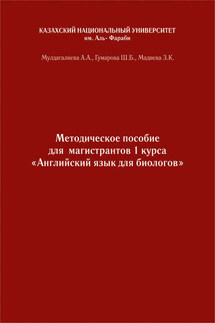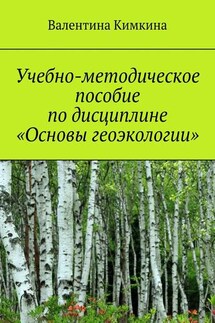Английский язык. Учебно-методическое пособие к практическим занятиям для биологов бакалавриата и магистратуры - страница 2
1) Kazakhstan occupies an enormous territory.
2) In this varied landscape a great number of species can be found.
3) Kazakhstan"s population is comparatively low.
4) Agricultural cultivation of the steppes forced changes in natural ecosystem.
5) Many natural species are now officially considered rare or endangered.
4. Answer the questions:
1) What species can be found in Kazakhstan?
2) What is the population of Kazakhstan?
3) What climatic zones of our country do you know?
4) What regions of environmental crisis in Kazakhstan are known to you?
5. Read the following sentences and point out the subject and the predicate in each of them:
1) Kazakhstan's biodiversity is seriously threatened.
2) The country's economic crisis had led to a lessening of human impact on natural ecosystems.
3) The largely unregulated transition to a market economy has encouraged extensive commercial use of many plant and animal species.
4) The projects are targeted at regions of environmental crisis.
5) A few nongovermental groups are beginning to take action.
UNIT III
New words and expressions:
salty – соленый
devastate – опустошать
trigger – вызывать
reverse – изменить
unfold – развертывать
basin – бассейн
shrink (shrunk) – садиться, вызывать усадку
irrigation – орошение
reduce – уменьшать
inflow – приток
evaporation – испарение
precipitation – выпадение осадков
estimate – оценивать
encompass – окружать
flow – течение
arise – возникать
saline – соляной
fishery – рыбный промысел
diversity – разнообразие
husbandry – сельское хозяйство
reed – камыш
diminuation – уменьшение
discharge – выделение
expand – расширять
recession – спад
gain – прибыль, прирост
loss – потеря, ущерб
prevent – предупреждать, мешать
surface – поверхность
shallow – мелкий
extend – простираться
drainage – сток
net – сеть, чистый
Read the international words and give their Russian equivalents:
major, history, effect, million, transport, hydrogeological, engineer, decade, problem, planet, serious, tragedy, national, central, fundamentally, balance, natural, hectar, canal, application, reservoir, filtration, system, result, accelerate, block, separate, western, portion, stabilize, kilometer
There are two major environmental disasters in the recent history of the former Soviet Union: Chernobyl and the Aral Sea. In 1960 the land-locked Aral Sea was the world's fourth largest lake, but now, due to increased irrigation demands on its two main inflowing rivers, it is now half the size, 16 m lower and three times as salty. The effect on the 3 mln people who needed the lake for its water, fish and transport has been slowly devastating. Sadly, the huge hydrogeological changes which engineers have unwittingly triggered will take decades to reverse. This paper investigates the nature, causes and consequences of the Aral Sea problem and discusses proposed solutions.
One of the planet's most serious environmental and human tragedies is unfolding in the basin of the Aral Sea. Over the past 40 years, the huge lake has shrunk considerably as expanding irrigation has reduced river inflow to it.
The Aral Sea is located among the deserts of Central Asia. A terminal lake (i.e., without surface inflow ), its level is fundamentally determined by the balance between surface inflow from two large rivers and net evaporation ( i. e. evaporation from its surface minus precipitation on it), which is estimated to be around 874 mm per year. Net ground water exchange plays a secondary role and data on it are approximate.






